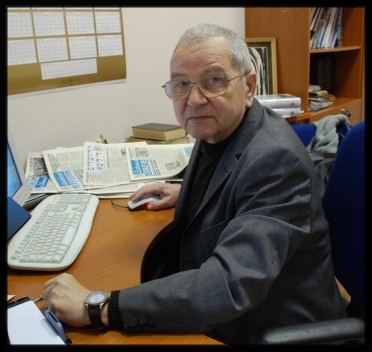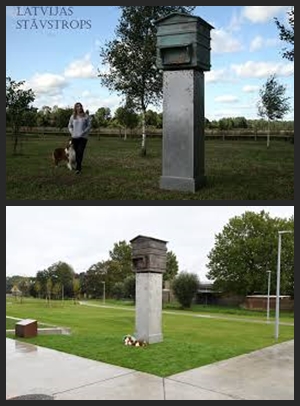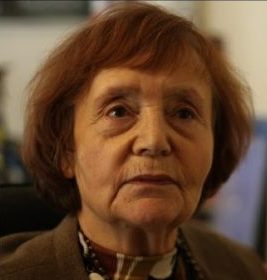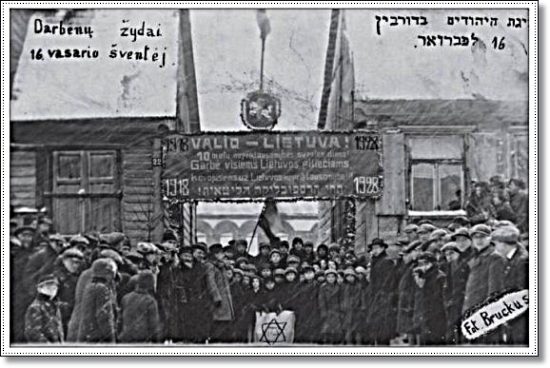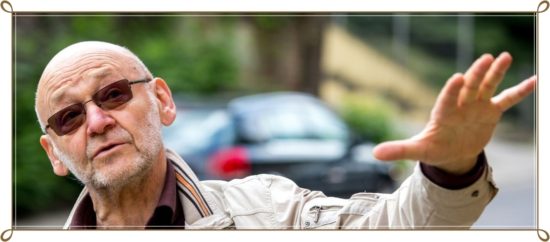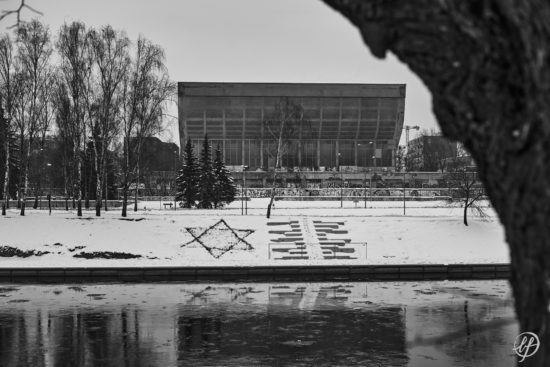Milan Chersonski: 1937 – 2021
Does In Geveb Interview Misrepresent the History of the 1990s Oxford Magazine ‘Yiddish Pen’?
IN GEVEB WATCH | OPINION | YIDDISH AFFAIRS
◊
Ayelet Brinn’s well-intentioned interview with Gennady Estraikh and Mikhail Krוtikov, published today in In Geveb, fails to ask the two veterans of Aaron Vergelis’s Sovetish Heymland about their controversial role in 1990s Oxford, together allegedly wrecking the Oxford Programme in Yiddish that had done so much in Yiddish Studies. They did so, allegedly, while becoming part of campaigns of personal destruction against the scholars who brought them there in the first place and worked countless hours to raise the support and facilities to bring them. Estraikh presented himself as a penniless graduate student in Moscow begging for help in the wake of the USSR’s collapse (winter 1990-1991) and came to study (in 1991) with Dovid Katz and Dov-Ber Kerler. Krutikov, by contrast, was an already-emigrated young scholar whom JTS’s main man in Yiddish recommended for Oxford as part of the wider project to dismantle the Oxford Program in Yiddish he had been railing against for years; he arrived in 1996, after a pseudo-search committee set up so that the JTS man’s recommendation would be the only one taken into account. The ex-Soviets went on to artfully trash the scholars who spent decades building the program. In classic Sovetish Heymland style intrigue mode, Krutikov was brought to Oxford primarily to serve as for-hire hit man. Both former students of A. Vergelis, both gifted actors and masters of machinations, used it as a launch pad for American careers and rapidly destroyed the magnificent program that they had usurped. That history will be written and is very heavily documented (down to Estraikh’s legally-forced apology for plagiarizing a grammar of one of his teachers, which he then “fixed” with a recall of the entire edition and addition of a front-cover credit sticker; the original is now a collector’s item). What is weird in the third decade of the twenty-first century is the (ab)use of In Geveb for an agenda of rewriting recent Yiddish Studies history for the glorification of a rather curious-bedfellow clique bringing together veterans of JTS and Sovetish Heymland (perhaps united by disdain for mainstream cultural Yiddishism, such as that of the late lamented Yiddish educator Naomi Prawer Kadar for whom one of the naive and manipulated enabling funding bodies is rightfully named).
See also:
DH’s section on History of — Yiddish at Oxford
Keepsakes & Documents
Belgian Composer Releases New Video on Eve of March 16th
ROLAND BINET | ARTS | MUSIC | LATVIA | RIGA’s WAFFEN SS MARCHES | REGIONAL FAR-RIGHT MARCHES | COLLABORATORS GLORIFIED
◊
Roland Binet, a Belgian composer working out of De Panne, has just released on Youtube a new video comprising his musical composition to a series of photographs by his wife Francine Binet taken during their joint visit to Riga in 2012, the Latvian capital, to monitor that year’s far-right March 16th parade. The annual marches glorify the Waffen SS, which fought for the Nazis and whose members all swore the oath of loyalty to Adolf Hitler. Mr. Binet is a veteran contributor to Defending History. His most recent and for many, quite startling piece, divulges the hard-to-believe erection of a monument to the Latvian Waffen SS in a town in Belgium.
Latvian Waffen SS Worshippers Have Set Up a Monument in — Belgium
OPINION | LATVIA | BELGIUM | COLLABORATORS GLORIFIED | HISTORY | POLITICS OF MEMORY
◊
by Roland Binet (De Panne, Belgium)
◊
Authorities in Riga, Latvia, who tolerate marches and memorials for the nation’s Waffen SS, that fought for Hitler and swore an oath to him, are nonetheless careful not to allow an overt monument to Nazi forces in Riga. How is it that modern-day glorifiers of the Waffen SS have managed to persuade a town in Belgium to host just such a monument (pictured in both images above)? The monument stands at the “Brivibaplin” in Zedelgem, a town situated in the province of West-Vlaanderen (West Flanders) in Belgium; GPS coordinate’s are 51.15 lat. 3.1333 long, some 20 kilometres west of Bruges.
◊
What does Latvia have in common with Flanders in Belgium? Believe it or not: a monument in honor of Latvian Waffen SS on Flemish soil in Belgium, a country in the heart of the European Union and prime home of the European Parliament. The Latvian Waffen SS was part of Adolf Hitler’s forces in wartime, Holocaust-era Eastern Europe and its member all swore an oath to Hitler. So how could this be? This is how the official press release put it on the day:
“On 23 September 2018, in the Belgian town of Zedelgem, the ‘Monument to Freedom’ sculpted by Latvian sculptor Kristaps Gulbis was unveiled. The monument is dedicated to the Latvian Legionnaires, who did not lose faith in freedom for the Latvian State, during the winter of 1945 to 1946 when they were held in Zedelgem prisoner of war camp.”
As excerpt from Mr. Valters Nollendsorf’s speech on the occasion:
President of Germany Honors Major East European ‘History Dissident’ Rachel Kostanian, Longtime Head of Vilnius’s Only Holocaust Museum
RACHEL KOSTANIAN | TRIBUTES ON HER 91ST BIRTHDAY | MUSEUMS | GERMANY
◊
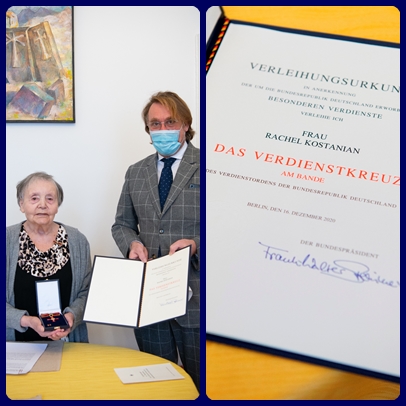
Andreas Görgen, head of the Directorate-General for Culture and Communication of Germany’s Federal Foreign Office presents Rachel Kostanian the Presidential Order of Merit signed by President Frank-Walter Steinmeier. Lukas Welz, chairman of AMCHA Germany was there and issued today’s press release. Photos: Florian Krauss for AMCHA Germany.
◊
VILNIUS—Rachel Kostanian, doyenne of Holocaust history dissidents in Lithuania and beyond led, for over a quarter century, a tiny little museum in a wooden green house — it came to be known internationally as The Green House — high up a driveway invisible from the street, that insisted on telling the bitter truth about the Holocaust. Though part of the state’s Jewish museum complex officially, she personally raised support for its own major projects and publications and kept the editorial control independent. Her museum told the truth about the Lithuanian Holocaust, starting with the mass campaign of murder, plunder, humiliation and violence unleashed by the “Lithuanian Activist Front” (LAF), and other local “White-Armbanders” before the first German soldiers even arrived in June 1941. The huge “Genocide Museum” on the city’s main boulevard, by contrast, some seven minutes’ walk away, has a large hall dedicated to glorification of these same collaborators as supposedly heroic leaders of an anti-Soviet “rebellion” (a strange term here, as the Soviets were fleeing Hitler’s Operation Barbarossa, the largest invasion in human history, not the local white-armbanded fascists). As it turns out, the issue comes to the fore in 2021, with the 80th anniversary of the events looming, and the nation’s parliament having named the year in honor of an LAF member accused of atrocities.
Berlin Press Release on German President’s Award of Order of Merit to Rachel Kostanian
◊
The following press release was received today from the office of Lukas Welz, chairman of the board of AMCHA Germany, who nominated Rachel Kostanian for the Order of Merit of the Federal Republic of Germany. Contacts: Email: info@amcha.de. Twitter: @amchade. Facebook: www.facebook.com/amcha.deutschland.
See also: Defending History’s report on the event; tributes and good wishes published on Ms. Kostanian’s 91st birthday; and DH’s Rachel Kostanian section.
◊
Rachel Kostanian Awarded the Order of Merit of the Federal Republic of Germany
◊
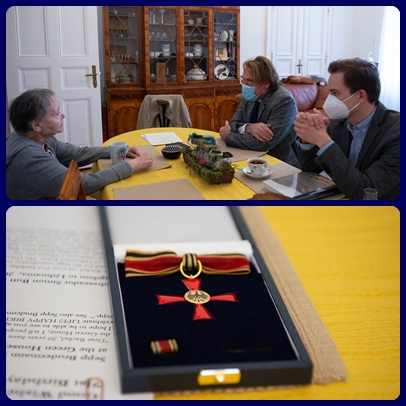
From left: Rachel Kostanian; Andreas Görgen, head of the Directorate-General for Culture and Communication of Germany’s Federal Foreign Office; Lukas Welz, chairman of AMCHA Germany. Below: The Order of Merit. Photos: Florian Krauss for AMCHA Germany.
◊
BERLIN—Rachel Kostanian was awarded the Order of Merit of the Federal Republic of Germany on February 9, 2021 in Berlin for her lifelong work in researching and remembering the Holocaust in Lithuania. For a quarter century she was director of a small but world-renowned and unique Holocaust museum in Vilnius, Lithuania, known as The Green House that she co-founded as Soviet rule was crumbling in the late 1980s.
Happy Independence Day, Lithuania!
◊
We all join in celebrating February 16th 1918, just 103 years ago, that ushered in the successful interwar republic. Classic image of the Jews of the shtetl Dorbyán (Darbėnai, northwestern Lithuania) in 1928 celebrating the tenth anniversary of the happy day so cherished by all the peoples in the land. . .
Commemorating the Holocaust and Healing Wounds in our Molėtai (Malát) District
MEMORIALS FOR JEWISH COMMUNITIES | MOLĖTAI (MALAT) | MUSEUMS
◊
by Viktorija Kazlienė
◊
Almost five years ago, an exceptional March of Jewish Remembrance took place in Molėtai, on 29 August 2016. On that occasion, an impressive monument was erected at the site of the mass murder of the Jewish citizens of Molėtai (known in Yiddish as Malát). For that, we are grateful to Tzvi Kritzer, a descendant of Molėtai Jews now living in Israel. Leonas Kaplanas, another son of survivors from the town, now living in Vilnius, also contributed significantly to organizing the March.
◊
◊
From Milan Chersonski’s Years as Editor of the Quadrilingual ‘Jerusalem of Lithuania’

From 1999 to 2011, Milan Chersonski, now a senior staff writer at Defending History, was editor-in-chief of Jerusalem of Lithuania, the newspaper of the Jewish Community of Lithuania that appeared from November 1989 to early 2011 in four separate editions in four languages — English, Lithuanian, Russian and Yiddish.
Professor Josifas Parasonis (Joseph Parason) Turns 80 in Vilnius
HAPPY 80th BIRTHDAY TO
Professor Joseph Parason
(Josifas Parasonis)
Key Figure in Vilnius’s Jewish Community
Major professor of the sciences of buildings and architecture at Vilnius Gediminas Technical University (VGTU); major national expert on the science of structures
Courageous champion of Jewish causes, ethics and democracy in the community, and the quest for historic truth and justice
Former deputy chairman of the Lithuanian Jewish Community and beloved mentor to young people of all backgrounds
Stalwart member of many years’ standing in the weekly Vilnius Yiddish Literary Circle
Contributor to numerous publications, including Defending History
[Historical note: Prof. Parasonis’s 80th is also the 80th anniversary of the events in Lithuania of 1941. His dramatic escape from his native Kaunas as 4½ month old toddler with his mother, and the fate of the rest of the family, are summarized here]
Suddenly, Strong Statements from the Long-Silent: Holocaust Posturing or Sincere Outrage?
OPINION | POLITICS OF MEMORY | LITHUANIA
◊
by Dovid Katz
◊
The decision announced by leaders of the three major universities in Lithuania, and of its History Institute, to belatedly break off ties with the antisemitic, ultranationalist, far-right, history-revisionist “Genocide Center,” a state-sponsored institution, is both “better than nothing” and “better late than never.” For over a dozen years now, Defending History has documented the Center’s role in spewing antisemitism, while underpinning ultraright Nazi-sympathetic nationalism and Holocaust obfuscation and denial wrapped up in pseudo-historical research; a similar record has been kept of its obedient showcase of fake history to the outside world, the “Genocide Museum”). The shocking wall of skittish silence on the part of professors, diplomats, and political leaders has been apparent not only within Lithuania, but also from some Holocaust, history and international (particularly American-based) Jewish organizations whose leaders covet the local medals, honors, photo-ops and junkets that give them that certain godlike ego-boost that is only to be had, it seems, east of the former Iron Curtain.
Battles over History Unleashed on Holocaust Remembrance Day 2021
On 27 January, Holocaust Remembrance Day 2021:
Silvia Foti in the New York Times on her Grandfather Jonas Noreika
❊
Lev Golinkin in the Forward on the Proliferation of Statues and Monuments Glorifying Nazi Collaborators and — their Export to the US, Canada and Other Western Nations
Good Wishes Pour In for Rachel Kostanian’s 91st Birthday on 31 Jan. 2021
[last update]
A selection from tributes received. More on Facebook
See also: Defending History’s Rachel Kostanian section
◊
◊
Sepp Brudermann (Austrian film maker, former volunteer at the Green House):
◊
Ambassador Simon Butt (Ambassador of the United Kingdom to Lithuania, 2008-2011):
◊
Ambassador Dónal Denham (Ambassador of Ireland to Lithuania, 2006-2010):
Meet the Nationalist Custodian of Ukraine’s New “Virtual Necropolis”
OPINION | GLORIFICATION OF COLLABORATORS | UKRAINE | UNITED STATES
◊
by Moss Robeson
◊
On International Holocaust Remembrance Day this year, The Forward published a shocking collection of articles by Lev Golinkin, a friend of Defending History, called the “Nazi Collaborator Monument Project.” As the most comprehensive survey of such monuments around the world it should be a catalyst for an international reckoning with the continued glorification of Holocaust perpetrators in the 21st century.
Less than a week earlier, Jerusalem Post reporter Jeremy Sharon shed light on a very different sort of project after exploring a digital cemetery being constructed by the Ukrainian Institute of National Memory (UINP). Launched in November 2020 for Ukrainians buried abroad, the “Virtual necropolis of the Ukrainian emigration” is far from complete, but is already stacked with Nazi collaborators, including “senior auxiliary police unit officials” who massacred Jews.
Several Brushstrokes of our Rachel’s Portrait
◊
by Markas Zingeris
◊
Rachel Kostanian-Danzig, one of the founders of the Vilna Gaon Museum of Jewish History, is celebrating her venerable ninety-first birthday. She belongs to the generation that survived the horrific years of the Second World War as well the times of the Soviet regime, and saw the fall of the Iron Curtain: the geopolitical “earthquake” that allowed Lithuania to take back control of its own history.
During her youth in Soviet times, Rachel completed a law degree at Vilnius University and qualified as an English teacher at the city’s Pedagogical University. Her field was not history, until the breakup of the Soviet Union and the rise of Lithuanian liberty gave her the freedom to immerse herself in the history and culture of her Jewish people. But no historian’s diplomas could match her relentless, painstaking and passionate desire to meaningfully fill the gaps in Lithuanian collective memory. Today’s young professionals could envy her enthusiasm and “engagement.”
Monuments to Nazi Collaborators in Eastern Europe and — Recent ‘Exports’ to the West
[UPDATED]
◊
Armenia. Estonia. Latvia. Lithuania. Macedonia. Slovakia. Ukraine.
Our take? The export of East European Holocaust revisionism is best exposed and countered now, before it becomes the pillar of the twenty-first century’s incarnations of Holocaust denial: Double Genocide, Holocaust Obfuscation, and glorification of the perpetrators as being (simultaneously) “heroes”…
This page was developed with the generous help of Lev Golinkin whose 26 January 2021 project in the Forward supersedes this page (see particularly his Lithuania section).
◊
JUMP TO:
Latvia → Belgium
Lithuania → USA
Ukraine → Canada
Ukraine → USA
◊
Tale of Two Lands: Ukraine’s and Lithuania’s State Policies of Glorifying Holocaust Collaborators Treated Very Differently by Israel’s Foreign Ministry?
◊
Israel’s Ambassador Joel Lion in Ukraine Boldly Condemns Annual Parade Glorifying Holocaust Collaborator Stepan Bandera; JTA’s Cnaan Liphshiz Reports
But at same time, Israeli Foreign Ministry colludes to silence dialogue on glorification of Holocaust collaborators in Lithuania (including the “naming of 2021“); Wiesenthal Center’s Dr. Zuroff protests in Jerusalem Post
Lithuanian Parliament’s dedication of 2021 to memory of J. Lukša, alleged Kaunas 1941 killer is little mentioned after powerful protests by two Israeli citizens — WJC’s Dr. Laurence Weinbaum, and Yakov Faitelson, son of legendary anti-Nazi partisan hero and escaper from Kainas IX Fort Alex Faitelson.
Women’s Issues in Today’s Lithuania
OPINION | WOMEN’S RIGHTS | HUMAN RIGHTS
◊
by Vilma Fiokla Kiurė
◊
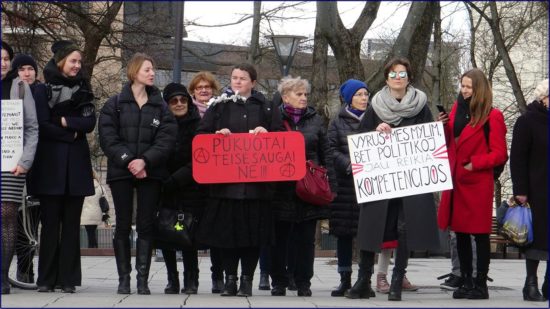
Women’s Day March in Vilnius, March 8, 2019. Vilma Fiokla Kiurė in the center, with a banner that reads “No to Fluffy Law Enforcement!!!” Banner on the right reads “We Love Men, but Politics Needs Some Competence”: a reversal of (then) Prime Minister Saulius Skvernelis’ comment on why there were no women in the previous Cabinet.
◊
In many respects women in Lithuania are in a far better situation than in our neighboring countries, Poland to the west , and Belarus to the east. In Poland, major efforts are underway to criminalize women for their personal reproductive choices. In Belarus, women stand in the front ranks of the struggle against Lukashenko’s regime. The imagery of Belarusian women and their stalwart protest that reaches us here, in Lithuania, is a powerful one.
We, on the other hand, live in relative peace and quiet. We are, moreover, rightfully congratulating ourselves on the new Cabinet that has replaced the previous all-male one. Now, the percentage of women in our Government is similar to that in other European states, where gender balance is a norm.
But while we count our blessings, we must continue to fight where there is still major discrimination. Women in Lithuania still earn 14% less, on average, than men in the same positions; women continue to suffer from domestic violence; the pandemic, according to statistics, harmed them the most, too. Women and — children.
